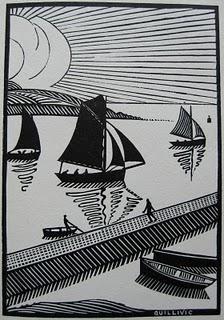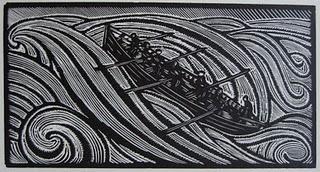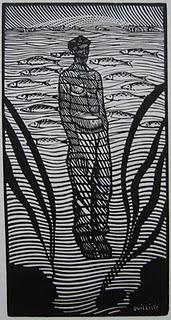 René Quillivic, Marine bretonneWoodcut, 1922
René Quillivic, Marine bretonneWoodcut, 1922Besides his sculptures, René Quillivic was noted for his woodcuts. He exhibited his prints in both Paris and London, and was a member of the Société de la Gravure sur Bois Originale. As a sculptor, Quillivic preferred the robustness of the woodcut (cut on the plank of the wood, with the grain) to the delicacy of the wood engraving (cut on the end grain).
 René Quillivic, La vagueWoodcut, 1929
René Quillivic, La vagueWoodcut, 1929No Breton artist can escape the sea, and René Quillivic is no exception. All three of my Quillivic woodcuts are marine subjects. They show a certain Art Deco elegance, and also the lingering influence of Japonisme, especially in the beautifully rhythmical depiction of a tumultuous sea in La vague (The wave).
 René Quillivic, Oceano NoxWoodcut, 1929
René Quillivic, Oceano NoxWoodcut, 1929Perhaps the most remarkable of the three is the one entitled Oceano Nox, after a poem by Victor Hugo. Is the fisherman in the image drowning, or simply entering a new life in the undersea world? In his essay "René Quillivic, graveur Breton" in the revue Byblis in 1929, Charles Chassé links this print to a second poem by Tristan Corbière, who writes of the death of sailors that
... ils sont mort dans leur bottesLeur boujaron au coeur, tout vifs dans leur capotes.They die with their boots on, their ration of rum in their hearts,
all alive in their sou'westers.

